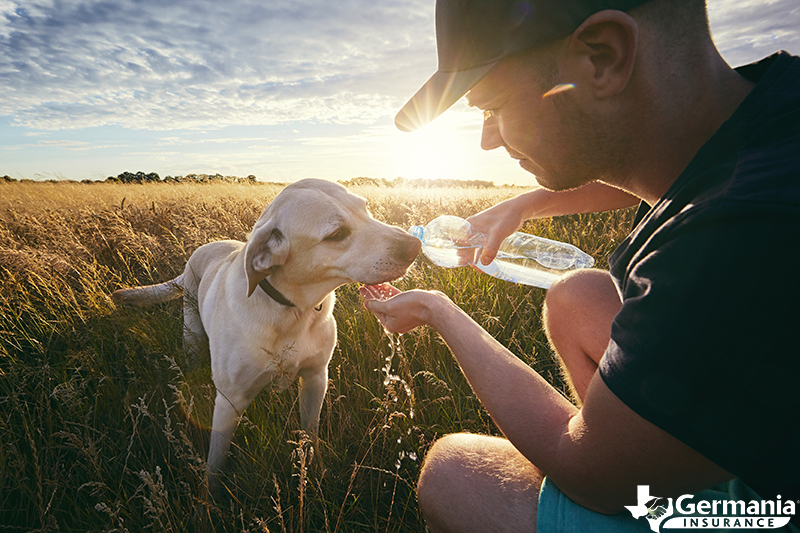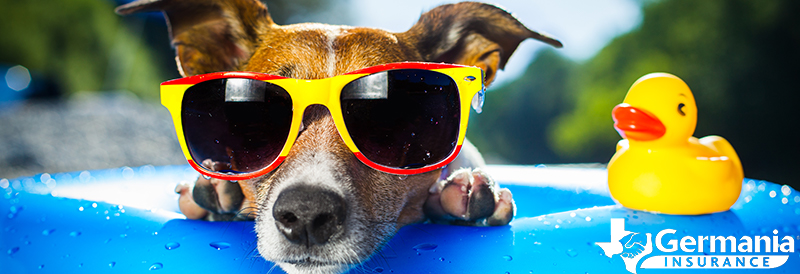Learn how you can beat the Texas heat and keep your pet safe during the summer

Dealing with the sweltering summer heat is part of being a Texan. Fortunately, as humans, we find all sorts inventive ways to stay cool. But what about our pets? Wild animals have a range of tactics for beating the heat, but our furry friends often rely on us! Without taking certain precautions, the intense temperatures can be potentially harmful. Today, we'll discuss how you can keep your pet safe in the Texas summer heat, so read on!
In your home: Understanding your pet's comfort levels
Most pets are comfortable at around the same temperatures as us humans. Dogs prefer a temperature of 68 to 78 degrees. Cats prefer temperatures around 70 degrees, but as any pet owner knows, they can also enjoy a lovely sunbeam from time to time.
A problem occurs when people set their
thermostat to shut off the air conditioning when they're out of the house. They might never know that their pets are suffering when they're gone. Because animals can't regulate their temperatures in the same ways we can, they can get hot very fast. At maximum, the AC should remain at 78 degrees.
But keeping a large house at a constant temperature that's comfortable to pets can be costly. If you have multiple air conditioning units, such as one for each floor in a house or window units, consider isolating your pet to a smaller area while you're gone. You may also consider leaving the ceiling fan on, or getting a stand alone fan. While fans may not cool the air, the circulation can go a long way to keeping a space from getting too still and hot.
Lastly, it's important to consider what may happen if you lose power during the height of the summer. We often think of ways to light our homes when the power goes out, but losing your air conditioning can be more than just uncomfortable - it can be dangerous for your pets. For this reason, it's always a good idea to have some sort of emergency plan in place should you lose power.
A backup generator is ideal, but not everyone has one of these. If possible, try to create a list of possible places you can take your pets if your AC isn't working. This could be a friend, family member, or possibly a pet-friendly hotel or
Airbnb.
In your backyard: Giving them a break to cool off
While outdoor pet houses can protect against the rain and possibly the cold of winter, they can often become sweltering in the Texas summer. That's why it's important to make sure that your pet has access to your home if they need it. If it's not possible for them to come inside at any point, it's important to make sure your yard has plenty of shady places for them to go.
When they are outdoors, they should have easy access to water. Even if they have access to water inside, they might not think to come inside to have a drink until they're already dehydrated.
Additionally, there are some other great ways to cool your pet down during the summer:
- Get a pool. A small children's wading pool can be perfect for dogs that want to cool off during the summer heat.
- Avoid the hottest times of the day. Keep your pets in when the sun is at its hottest and avoid too much exercise during the day, or they could overheat without realizing it.
- Buy a sprinkler. Sprinklers are great for both dogs and children and can be ideal for family outdoor time.
- Purchase an air-conditioned pet house. While a little decadent, this can go a long way to helping a pet keep cool, especially if you don't want to cool your own home.
Most importantly, keep an eye on your pet whenever possible. While pets are generally good at figuring out how to cool off, they may not always know what's best for them.
In your car: Vehicle safety for your pet
Animals should not be left in a car during the summer - not even for a few minutes. In the heat of the Texas summer, a cool car can skyrocket in temperature in just a few moments. For example, even if it's only 80 degrees outside, the inside of a car
can spike to 120 within a short time, which can easily be fatal for your pet.
There are some caveats, however. If you leave your car running with the air conditioning on, they should be fine. This is much better than leaving the windows open; even a car with cracked windows gets very hot very quickly. However, if your air conditioning fails, your pet could be in trouble very fast, so it's best to only do this for short errands. If you are going to leave your pet for a few minutes, with the air conditioning on, consider leaving a note in your window so that bystanders know your pet is afe.
While
Texas courts have ruled against "good samaritans" breaking into a vehicle to rescue an animal , there are some options if you come across a pet left alone in a hot car.
The Human Society suggests that you take the license plate, make, and model of the car, and notify the manager of nearby businesses so that they can try and page the owner. If this fails, call the non-emergency police line and wait by the vehicle.
In your neighborhood: Protecting your pet while on a walk
If it's too hot for you to walk on the pavement,
it's too hot for your pet. While the air temperature may only be 86, the asphalt or pavement could be 135 degrees or higher.
A lot of people think that paw pads are more resilient than they are. The problem is that pets don't react to pain the same way people do, and in their excitement, they may not realize that they're getting hurt. People may also confuse pain with excitement. Before you go on a walk, you can rest your hand on the pavement to test the temperature. If you can wait seven seconds without feeling pain, it's probably safe.
If it's hot out, consider walking your pets during dusk or dawn. Otherwise, you may consider looking into dog boots! That's right,
they make little shoes to protect their paws! It will likely take some time for them to adjust, though, so be prepared for them to be a little confused at first.
Responding to heatstroke and dehydration
Even as cautious as you are, your pets can get into trouble during high temperatures. Maybe they stayed outside a little too long or just got a little too excited during the day. That's why it's important to able to recognize the warning signs and symptoms of heatstroke or heat exhaustion:
- Panting, with a dry tongue or nose.
- Lethargy and weakness.
- Drooling and red gums.
- Rapid heart rate.
- Vomiting.
So how do you treat heatstroke in a pet? The simply answer is the vet. Heatstroke can become a serious medical problem very quickly and requires the aid of a trained professional.
On your way to the vet, try to get them to drink water, but don't force it. You can try to pour cool, room temperature water on them (not cold). You can also apply a cool, wet towel, gently laying it on their neck, armpits, between their hind legs, and carefully wet their ears and paws. Your vet will be able to give them IV fluids to rehydrate them quickly.
What NOT to do to keep pets safe in the summer
While keeping your pet safe in the summer sun is important, there are a number of solutions that may seem intuitive, but could be potentially harmful to your pet, such as:
- Never dunk a pet in cold water. This could be a shock to their system and cause more damage to them, rather than helping them recover.
- Don't shave your pets unless advised to by a vet. Pet fur insulates them against both heat and cold. If you shave them, they can't regulate their temperature.
- Avoid bathing them too often. While a bath can be short-term relief, it strips oils from the pet's skin that otherwise protect them.
 Tired of getting burned on insurance rates in Texas? Germania Insurance is here to help! Request a free quote online or reach out to one of our trusted agents today!
Read more:
Tired of getting burned on insurance rates in Texas? Germania Insurance is here to help! Request a free quote online or reach out to one of our trusted agents today!
Read more: If you plan on hitting the water this summer,
read our blog to brush up on Texas water safety laws!